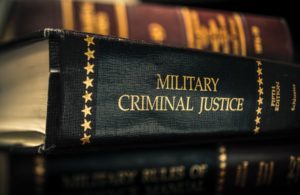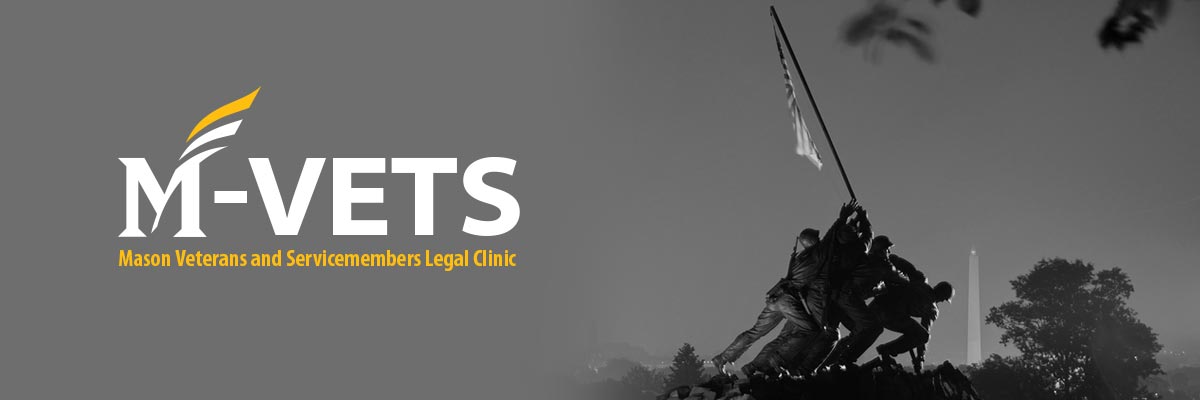
By Fall 2018 M-VETS Student-Advisor Stephanie Musilek
The civilian criminal justice system exists to serve several purposes including obtaining justice for victims, punishing wrongdoers, and deterring future wrongs, but also providing due process of law to those accused of wrongdoing, thus ensuring fairness in the process. In this system, there are many players who all play different roles in the process and are all intended to be impartial (save for the attorney advocates working on behalf of the accused). For example, a prosecutor is intended to be impartial and only bring cases where there is evidence to convict the accused or a jury of the accused’s peers who are supposed to hear evidence and then vote whether or not to convict the accused. The investigating officers who collect evidence of crimes are also intended to be impartial. For criminal matters, the accused is also guaranteed counsel, per the Fifth and Sixth Amendments to the United States Constitution. In theory, these aspects of the criminal justice system exist to serve the goals of the criminal justice system, including justice and fairness. In practice, issues arise at all levels of the criminal justice system that prevent the system from meeting its goals, and many articles have been written on that topic and will not be discussed here. But the system’s structure is such that when everything works as it is supposed to, victims and accused are protected. This blog post will address the similarities and differences between aspects of the civilian criminal justice system and the military justice system.
The justice system that governs the military is separate and distinct from the civilian criminal justice system. The Uniform Code of Military Justice is codified at Title 10 Sections 801 to 940 and Title 14 Sections 508 and 509 of the United States Code and governs all aspects of criminal behavior by service members along with other kinds of misconduct by service members that does not have a civilian analog such as dereliction of duty, failure to follow a lawful order, or disrespect.[1] In the civilian world, when a crime is committed, a prosecutor will review the evidence and decide if charges should be brought against that individual. In the military context, the commander of the accused is the person with prosecutorial discretion.[2] This means that the commander decides whether to resolve charges against a service member administratively by informal counseling or limitations of privileges, for example, or to refer the charges to trial by court martial.[3] The power to convene a court martial given to a commander, makes the commander the “convening authority,” but the President, the Secretary of Defense, or the Secretaries of the various branches of the military also may also convene a general court martial under the statute.[4] A general court martial is for the most serious offenses.[5] Summary court martial and special court martial are for more minor offenses.[6]
The convening authority has additional powers as well. Before the trial, the convening authority can gather facts for the trial using either a commander’s inquiry, law enforcement agencies, or an Article 32 investigation.[7] Also similar to a prosecutor, during a trial, the convening authority can grant immunity to witnesses.[8] This is an expansive power because by declining to offer immunity to some witnesses, a court martial might not be able to proceed without their testimony.[9]
The convening authority is also the one responsible for selecting the people who will serve on a court martial.[10] While prosecutors in the civilian legal system play an important role in selecting jurors for a trial, they do not have total control of who serves on a jury. While juries are never perfect, they are intended to be composed of peers of the accused. In a court martial, enlisted members of the military may only serve on the court martial when an accused requests that they are, otherwise, the members of the court marital are officers.[11] Even when an enlisted service member requests that enlisted members are on his or her court martial, the convening authority can deny the request assuming they explain the reasoning in writing.[12] This is an incredible power given to commanders in the military that has no comparable analog in the civilian criminal justice system.
Another analog that the military justice system has to the civilian system is the Article 32 hearing. This preliminary hearing prior to a court martial is similar to a civilian grand jury proceeding.[13] A grand jury proceeding allows a prosecutor to show evidence to a panel of people and they will vote on whether charges should be brought against the accused, per the Fifth Amendment to the U.S. Constitution. But unlike a grand jury proceeding, an investigating officer in an Article 32 hearing gives a report summarizing the hearing proceedings and recommending whether to prosecute.[14]
Article 60 of the UCMJ gives the convening authority power above and beyond what a normal prosecutor can do. Under this section, the convening authority “may approve, disapprove, commute, or suspend the sentence of the court-martial in whole or in part.”[15] The statute also provides that a convening authority must provide written explanation for the change, but even with this provision, this is enormous power given to a single individual. A reason for such broad authority includes enabling commanders to ensure good order and discipline, which is a central part of being a leader. Another reason for the broad authority under the UCMJ is that it allows commanders to treat service members the same no matter where the crime is committed.[16]
The military justice system concentrates authority over the accused in a single individual, whereas in the civilian criminal justice system the authority is more diffuse. While It is important that commanders are able to maintain discipline and order in their ranks, a justice system should also provide justice to victims and due process to the accused. Sexual assault cases in the military are especially susceptible to failing victims.[17] The military justice system has additional goals on top of those that the criminal justice system has and there are arguments for reforming the military justice system to make it more similar to the civilian justice system. Depending on one’s perspective, the additional goals of order and discipline present in a military justice system are overriding factors that counsel against taking away any power from commanders.
[1] Captain David Classen, Military Justice Under Fire: Commanders’ “Convening Authority” Power, Bench and Bar of Minnesota (Nov. 11, 2013), http://mnbenchbar.com/2013/11/military-justice-under-fire-commanders-convening-authority-power/.
[2] The Commander’s Role in the Military Justice System, Appendix B, B-1, http://library.enlistment.us/field-manuals/series-2/FM8_10_5/APPB.PDF.
[3] The Commander’s Role in the Military Justice System, Appendix B, B-1, http://library.enlistment.us/field-manuals/series-2/FM8_10_5/APPB.PDF.
[4] 10 U.S.C. § 822.
[5] The Commander’s Role in the Military Justice System, Appendix B, B-4, http://library.enlistment.us/field-manuals/series-2/FM8_10_5/APPB.PDF; 10 U.S.C. § 816.
[6] The Commander’s Role in the Military Justice System, Appendix B, B-4, http://library.enlistment.us/field-manuals/series-2/FM8_10_5/APPB.PDF; 10 U.S.C. § 816.
[7] The Commander’s Role in the Military Justice System, Appendix B, B-2, http://library.enlistment.us/field-manuals/series-2/FM8_10_5/APPB.PDF; Article 32 investigation refers to the preliminary hearing that is proscribed in 10 U.S.C. § 832 as mandatory before a general court martial can be convened.
[8] The Commander’s Role in the Military Justice System, Appendix B, B-2, http://library.enlistment.us/field-manuals/series-2/FM8_10_5/APPB.PDF.
[9] Captain David Classen, Military Justice Under Fire: Commanders’ “Convening Authority” Power, Bench and Bar of Minnesota (Nov. 11, 2013), http://mnbenchbar.com/2013/11/military-justice-under-fire-commanders-convening-authority-power/.
[10] 10 U.S.C. § 825.
[11] 10 U.S.C. § 825(c)(1).
[12] 10 U.S.C. § 825(c)(1).
[13] Captain David Classen, Military Justice Under Fire: Commanders’ “Convening Authority” Power, Bench and Bar of Minnesota (Nov. 11, 2013), http://mnbenchbar.com/2013/11/military-justice-under-fire-commanders-convening-authority-power/.
[14] Captain David Classen, Military Justice Under Fire: Commanders’ “Convening Authority” Power, Bench and Bar of Minnesota (Nov. 11, 2013), http://mnbenchbar.com/2013/11/military-justice-under-fire-commanders-convening-authority-power/.
[15] 10 U.S.C. § 860(c)(2)(B).
[16] Captain David Classen, Military Justice Under Fire: Commanders’ “Convening Authority” Power, Bench and Bar of Minnesota (Nov. 11, 2013), http://mnbenchbar.com/2013/11/military-justice-under-fire-commanders-convening-authority-power/.
[17] U.S. Dept. of Defense, “DoD Releases Annual Report on Sexual Assault in Military” May 1, 2018, https://dod.defense.gov/News/Article/Article/1508127/dod-releases-annual-report-on-sexual-assault-in-military/.

